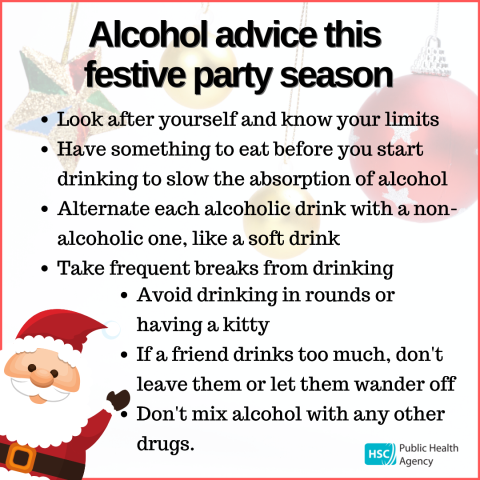Top tips to enjoy alcohol safely this festive season

With the festive party season under way, the Public Health Agency (PHA) is offering some helpful safer drinking advice for those who choose to drink alcohol.
Many of us tend to over-indulge at Christmas but overdoing it with alcohol could seriously damage your health.
Kevin Bailey, the PHA’s Regional Lead for Drugs and Alcohol, said: “Many of us like to have a drink at this time of year and we’re not saying people shouldn’t, but it’s important that we enjoy ourselves safely.
“It is easy to forget that alcohol is a powerful drug and we need to be careful how we use it. Drinking too much has a negative impact on you and those around you.
"By setting a plan you can avoid drinking too much and, hopefully, avoid the negative impacts alcohol can have, such as hangovers, doing things you later regret, getting injured, getting into fights and feeling low or anxious.”
Ten top tips for safer drinking this Christmas:
- Eat before or while drinking and avoid salty snacks, which make you thirsty.
- Be assertive – don’t be pressured into drinking more than you want or intend to.
- Know your limits and stick to them.
- Stay busy – don't just sit and drink. Dance or have a game of pool if you're at a pub as it will reduce the amount of time you spend solely on drinking.
- Try not to confuse large measures of alcohol with standard measures, eg a glass of wine served at a party or at home may be much larger than the standard 125ml.
- Keep track of your drinks and don't let people top up your drink until it's finished.
- Try alternating alcoholic drinks with water or other non-alcoholic drinks. Add plenty of mixer to your drinks to make them last longer.
- Avoid rounds, ‘shouts’ and kitties – drink at your own pace, not someone else's.
- Drink slowly – take sips, not gulps.
- Don’t mix alcohol with any other drugs, including prescription medication.
The Chief Medical Officers’ alcohol guidelines recommend that both men and women drink no more than 14 units per week – that’s the same as around five pints, so you can see how quickly the units add up. If you do drink as much as 14 units per week, it is best to spread this evenly over three days or more. You can't ‘save up’ your units for a particular day or a party.
“Try to avoid binge drinking. It has been shown to have adverse effects on our health and safety. Binge drinking can have a major impact on your physical health, causing damage to the liver, heart, brain and stomach,” Kevin said.
“Drinking too much can also affect our judgement and also lower your inhibitions. You may take more risks when it comes to sex, such as not using condom, which increases your chances of getting a sexually transmitted infection such as chlamydia, HIV or hepatitis. It could also lead to an unplanned pregnancy.
“It’s important that both men and women plan ahead, prepare for the possibility of sex, and carry condoms.
“Alcohol can also have a major impact on your emotional health and wellbeing. Being hungover can make you feel anxious and low. Some people may already feel down over the Christmas period and drinking can make this worse.
“It is therefore important that people understand their drinking behaviour and explore their relationship with alcohol, whether it’s a positive or negative one, so that they can enjoy the Christmas holiday.”
It’s also important to be aware of the impact of taking alcohol with other substances.
Kevin Bailey added: “Something that many people don’t realise is the serious impact that mixing alcohol with other drugs, including prescription medication, can have. The mix can increase the toxicity of the drug and can have a serious impact, and can even result in death.
“For example, mixing alcohol and cocaine is a toxic mix and could cause your heart to stop. The safest advice is to not take any other drug along with alcohol, or mix any other drugs at all, if you are planning on using them.”
To find out more about alcohol, or to get help from a professional – for yourself, or someone you care for or are concerned about – visit www.DrugsAndAlcoholNI.info. Services are available across all Health and Social Care Trust areas.
More information on looking after your mental health and the support which is available across Northern Ireland can be found at www.MindingYourHead.info
If you or someone you know is in distress or despair, call Lifeline on 0808 808 8000.The helpline is available 24 hours a day, seven days a week and a trained counsellor is ready to take your call.
People with hearing difficulties can contact the Lifeline Textphone service on 18001 0808 808 8000. Calls to Lifeline are free to people living in Northern Ireland who are calling from UK landlines and mobiles.
